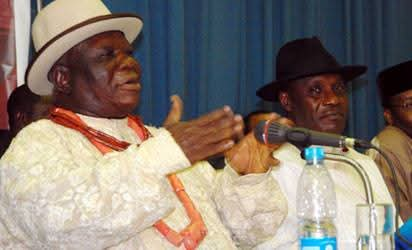By Adeyemi Adekunle
An elder statesman Edwin Clark has denounced the removal of former Chief Justice of Nigeria (CJN) Walter Onnoghen as an act of “disgrace” and “barbarity.” His comments reflect growing concerns about judicial independence in Nigeria, particularly following Onnoghen’s controversial suspension by former President Muhammadu Buhari in January 2019, just ahead of the presidential elections.
In an open letter that has garnered significant attention, Clark, a revered figure in Nigerian politics, condemned the political machinations that led to Onnoghen’s removal. He characterized the act as “callous” and “unjust” and acknowledged the damaging implications it holds for Nigeria’s judicial integrity. “What happened to Onnoghen is not just a shame for him; it’s a blemish on the image of our nation,” he stated, underlining the far-reaching consequences of undermining judicial independence.
Walter Onnoghen, who served as CJN from 2017 until his suspension, had faced allegations of false asset declarations brought by the Code of Conduct Bureau. These allegations were widely perceived as politically motivated, particularly given Onnoghen’s attempts to maintain judicial independence amid a politically charged atmosphere. Critics of the Buhari administration argued that the former president sought to control the judiciary to further his political interests, an assertion reinforced by Clark’s remarks.
In an unexpected turn of events, Onnoghen was acquitted by the Court of Appeal in Abuja on November 4, 2024. The court dismissed the previous charges against him and ordered the return of four bank accounts that had been forfeited. This decision is not only a vindication for Onnoghen but also raises questions about the integrity of the actions taken against him during his tenure. “It is a step towards justice,” Clark noted, commending the court’s ruling and the restoration of Onnoghen’s dignity.
Further, Clark lauded the current CJN, Kudirat Kekere-Ekun, for her efforts to address the injustices that beset her predecessor. He praised her bold actions as a significant move towards reforming the Nigerian judiciary. “Her courage in tackling the issues left by Onnoghen’s disgraceful removal signifies a positive shift in our judiciary,” he declared. Clark’s endorsement of Kekere-Ekun underscores the importance of strong leadership in restoring public confidence in the judicial system.
In his letter, Clark also issued a stern warning to the current administration led by President Bola Tinubu. He emphasized that no individual, irrespective of their status, should be considered above the law. The elder statesman’s remarks resonate powerfully in a political climate where the separation of powers is increasingly scrutinized. Clark’s insistence on accountability sends a clear message: actions taken against Onnoghen should not become a precedent for future injustices.
The reverberations of Onnoghen’s removal continue to influence public discourse in Nigeria, with many viewing it as emblematic of the broader struggles faced within the judiciary. The restoration of his honor reinforces the urgent need for reforms to safeguard judicial independence from political interference. “Those responsible for this injustice must be held accountable to ensure that history does not repeat itself,” Clark urged, advocating for a system where justice prevails over personal vendettas.
Onnoghen’s tenure as CJN was marked by significant challenges as he navigated issues involving electoral integrity and a judiciary under immense pressure from the executive branch. His removal not only sparked outrage among legal practitioners but also illuminated a critical issue in Nigeria—how the interplay between politics and law can destabilize an already fragile judicial framework.
As Nigeria continues to grapple with systemic issues, Clark’s commentary serves as a rallying cry for citizens and legal practitioners alike. His articulation of grievances highlights the importance of preserving judicial integrity as a cornerstone of democracy. It calls upon Nigerians to remain vigilant and actively engage in dialogues surrounding transparency and accountability within their institutions.
While the acquittal of Walter Onnoghen represents a pivotal moment for Nigeria’s judiciary, the implications of his suspension linger. The discussions prompted by Clark’s letter may lay the groundwork for a renewed commitment to judicial independence. As the nation looks ahead, the hope remains that the lessons learned from this turbulent chapter will guide future reforms toward a more equitable and just legal system.




